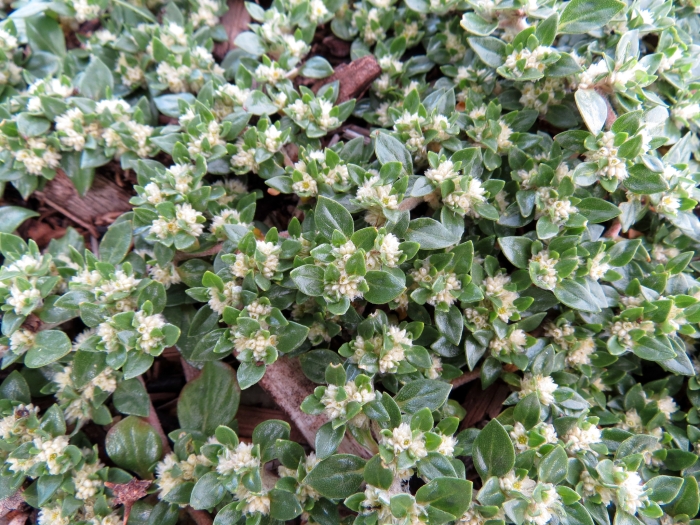Small Matweed
(Guilleminea densa)
Small Matweed (Guilleminea densa)
/
/

Katja Schulz
CC BY 4.0
Image By:
Katja Schulz
Recorded By:
Copyright:
CC BY 4.0
Copyright Notice:
Photo by: Katja Schulz | License Type: CC BY 4.0 | License URL: http://creativecommons.org/licenses/by/4.0/ | Rights Holder: Katja Schulz | Publisher: iNaturalist | Date Created: 2017-08-20T13:32:33-07:00 |



















































Estimated Native Range
Summary
Guilleminea densa, commonly known as Small Matweed, is a perennial herb that can be either semi-deciduous or deciduous, depending on the climate. It is native to the grasslands and dry forests of the Central and Southern Andes, as well as the Gran Chaco region, which is characterized by hot summers and a wide range of soil types, from sandy to clay. Small Matweed typically reaches a height of 0.2 feet (0.06 meters) and spreads out to 0.7-1 feet (0.2-0.3 meters), forming a dense ground cover. It has a prostrate growth habit with small, green leaves and produces cream-colored flowers during the summer and fall months. The flowers are modest in size and not particularly showy, but they do add a subtle charm to the plant’s overall appearance.
Small Matweed is valued for its drought tolerance and ability to thrive in poor soils, making it an excellent choice for xeriscaping and rock gardens. It is also used as a ground cover in areas with hot, dry climates. In cultivation, it requires minimal care, preferring full sun exposure and soils with fast drainage. While it can tolerate low water conditions, occasional watering during prolonged dry spells can help maintain its vigor. It is not commonly affected by diseases or pests, making it a low-maintenance option for gardeners. However, it is important to avoid overwatering, as this can lead to root rot.CC BY-SA 4.0
Small Matweed is valued for its drought tolerance and ability to thrive in poor soils, making it an excellent choice for xeriscaping and rock gardens. It is also used as a ground cover in areas with hot, dry climates. In cultivation, it requires minimal care, preferring full sun exposure and soils with fast drainage. While it can tolerate low water conditions, occasional watering during prolonged dry spells can help maintain its vigor. It is not commonly affected by diseases or pests, making it a low-maintenance option for gardeners. However, it is important to avoid overwatering, as this can lead to root rot.CC BY-SA 4.0
Plant Description
- Plant Type: Herb
- Height: 0.1-0.2 feet
- Width: 0.7-1 feet
- Growth Rate: Moderate
- Flower Color: White
- Flowering Season: Summer, Fall
- Leaf Retention: Semi-Deciduous, Deciduous
Growth Requirements
- Sun: Full Sun
- Water: Low
- Drainage: Fast
Common Uses
Drought Tolerant, Low Maintenance
Natural Habitat
native to the grasslands and dry forests of the Central and Southern Andes, as well as the Gran Chaco region, which is characterized by hot summers and a wide range of soil types, from sandy to clay
Other Names
Common Names:
Scientific Names: , Guilleminea densa, Brayulinea densa, Guilleminea densa var. densa, Guilleminea illecebroides, Gossypianthus australis, Guilleminea australis, Illecebrum densum, Achyranthes conferta, Brayulinea australis
GBIF Accepted Name: Guilleminea densa (Willd.) Moq.